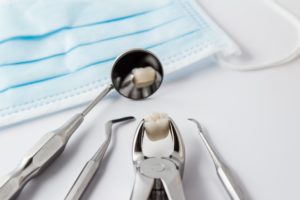
Permanent teeth are supposed to be just that: permanent. Dentists will always do what they can to help patients preserve their natural teeth, but sometimes an extraction is what’s better for the person’s health. Teeth that are broken beyond repair, overcrowded, infected, or damaged by periodontitis can all cause serious health problems if not extracted. A recent study from the Centers for Disease Control and Prevention show that by 17 years old, 7% of Americans have already had at least one permanent tooth extracted because of tooth decay. By the age of 50, Americans have lost an average of 12 permanent teeth, including wisdom teeth.
So, if you’ve recently had a tooth extraction in Marlton or will be getting one soon, you aren’t alone. But once the procedure is over, what comes next? Read on to learn what you can expect in the days to come, and what to do now that you’re missing a tooth.
Do’s and Don’ts for Tooth Extraction Aftercare
Here’s what you should, and shouldn’t do, in your first 24 hours after your tooth extraction:
- Do take it easy and limit your activity. You need to keep your blood pressure low so that a blood clot can form over the extraction site.
- Don’t eat hot food or drinks. The area will be numb, and you could burn yourself without realizing it.
- Don’t rinse your mouth out. This could disturb the forming blood clot.If you experience bleeding, gently apply pressure to the area with gauze using your jaw.
- Do take pain killers if you need to. Avoid any painkillers containing aspirin to keep your blood pressure low. You can also apply ice for 10 minutes at a time to reduce swelling.
Tips to Heal Quickly
Any pain from your tooth extraction should ease within a few short days. However, that doesn’t mean you’re done healing! Over the next 10 days be sure to:
- Limit physical activity like exercising, playing sports, and heavy lifting to keep your blood pressure low and protect the blood clot.
- Try to do most or all your chewing on the other side of your mouth as the extraction site to keep it clean and safe. Stick to eating soft foods.
- Avoid using straws, sucking on hard candy, or spitting to reduce the likelihood of the blood clot becoming dislodged.
Should I Replace My Extracted Tooth?
In short, the smart answer is yes. Even if you don’t think anyone will notice, your remaining teeth will. They might shift or change to compensate for the missing tooth, becoming overgrown or crooked.
One option to keep your teeth healthy and functional after a tooth extraction is to replace it with a dental implant in Marlton. These securely attached, biocompatible prosthetic teeth look and act like natural ones. They are durable enough to last a lifetime with the proper care and will restore optimal dental function after your tooth extraction.
A tooth extraction may seem like an ordeal, but you can quickly and easily get through it if you follow these tips for the days that follow. Keep the rest of your teeth healthy and functional by seeing your dentist every six months, and consider rebuilding your smile with a dental implant.
About the Author
Dr. Jennifer L. Kazemi is a graduate of University of Pennsylvania School of Dental Medicine and continues her education all over the world to stay current on the newest in dental implant technology. She has traveled to both the Nobel Biocare Headquarters in California and the Astra headquarters in Sweden to study the design and restoration of dental implants. If you’d like to learn more, she can be reached at her website or at (856) 985-1001.
